Honor of Lancaster: A Magna Mundi England AAR
- Thread starter dharper
- Start date
-
We have updated our Community Code of Conduct. Please read through the new rules for the forum that are an integral part of Paradox Interactive’s User Agreement.
You are using an out of date browser. It may not display this or other websites correctly.
You should upgrade or use an alternative browser.
You should upgrade or use an alternative browser.
Perhaps!stnylan said:Ahh, perhaps one day the two crowns can be reunited as they were always meant to be!
Yes, but not much. You can actually see it on the map of the war - that one red province in the north, and of course the province the war started over in Maine. The French really did a great job of colonizing New France - nearly every province had been built into a colonial city - when I first explored the region, I was a little taken aback by it. But I had one major advantage: I had cores and could build troops in the New World; they did not, and so had to ferry troops over the Atlantic. Even without naval attrition, that's still hard for the AI.BBBD316 said:Did you manage to steal any of New France?
I have to tell you, I have never been so annoyed with France as in this game! Finally winning a legitimate victory was just...amazing.Kurt_Steiner said:The revenge from the Hundred Years War is near...
Thank you! I was surprised by how much easier this war was than the last; the colonies have really paid for themselves now. In a way, it was frustrating to realize that I wouldn't get more than three provinces from them in the peace - when those rebels appeared I was really, really tempted to try and break them...but even after losing colonies to the Indians my reputation was pretty high - simply taking 6 provinces that way would have put me over the limit. I'm lucky I didn't get framed!Vann the Red said:Well-timed and well-fought, dharper. Great Britain is ascendant.
It never ceases to amaze me how durable these claims are—they often pass through half a dozen usurpations and dozens of generations before they are dropped.
Indeed, war calls on the horizon, but if it goes like this last one, you'll be in good shape.
Great post yet again, sir. Reads like a good history - with enough detail to flesh out the action, but not enough to get tedious. Very nice.
Great post yet again, sir. Reads like a good history - with enough detail to flesh out the action, but not enough to get tedious. Very nice.
British monarchs continued to claim the title of King or Queen of France until 1801, although it was a nominal claim at best. It was still a powerful idea until the mid 16th century, though.Fulcrumvale said:It never ceases to amaze me how durable these claims are—they often pass through half a dozen usurpations and dozens of generations before they are dropped.
Thank you! I enjoy reading history books...a strange hobby, perhaps.coz1 said:Indeed, war calls on the horizon, but if it goes like this last one, you'll be in good shape.
Great post yet again, sir. Reads like a good history - with enough detail to flesh out the action, but not enough to get tedious. Very nice.
Well, only one more chapter to go...I should have it posted tomorrow.
It's sad there's only one chapter left. This has been a very enjoyable ride dharper.
This has been a very enjoyable ride dharper.
isca said:How are you going to completely crush France in one chapter???
Extremely fast, I guess.
isca said:How are you going to completely crush France in one chapter???
You're both making quite the assumption there! I never claimed that conquering France was a goal - whereas the ending in 1599 was set in stone.Kurt_Steiner said:Extremely fast, I guess.
In the end, I made one small fudge for the sake of the story that ought to clear this up, however.
Posting soon...I'm waiting for Photobucket to come back up.
XII. End of a Dynasty
Lessons Learned
Lessons Learned
The war against France had been won, but not without a price. Over the next few years, Frederick had to deal with many problems: growing reaction against Britain in Europe, the native threat in the Americas, the rebuilding of the officer corps and the navy before the next war, absorbing Normandie into the kingdoms, and securing the line of succession.
The younger brother of George IV, Frederick was already old when he took the throne reluctantly in 1581. More to the point, Frederick had married late in life and had only one child: a daughter named Anne, still too young to inherit. Refusing to remarry after his beloved wife passed away, he guaranteed the throne would pass to a girl. When Frederick became king, he realized that the throne would pass to her - but also that Britain had suffered more than its share of succession crises for the past two centuries. Although Anne was the clear heir, she was a young woman - a girl, even - in a country where reigning queens were rare. This made her a target for the House of Tudor to begin anew a civil war - one which could destroy all the gains his family had made. The succession had to be secured. Much of Frederick's reign was devoted to this task. It meant spending a great deal of time and effort attempting to bring stability and peace to the nation - effort that could have gone elsewhere instead. Despite this, Frederick's reign dealt with many of the other problems facing the crown.
Britain's continued expansion had won them the envy of Europe - but not always their respect. The balance of power in Europe demanded a strong Britain checked by a strong France, and vice versa. With France beginning to crumble, the powers of Europe awoke to the danger of the two crowns united. The Holy Roman Empire to the east and Spain to the west both posed a formidable challenge to any who dared upset things, and this meant that Britain had to tread carefully - even in the New World, where Britain turned to once more.
The British public were infuriated by their humilation against the Huron, and the settlers even more; colonial councils voted in special taxes to be collected for colonial defense and called up militias. The French and Indian War had taught Britain many lessons. The most notable were in pitched combat, where the British knights played a significant role - yet often fought in undisciplined formations.
Following the peace of 1583 the Royal Cavalry were reformed in a more martial Caracolle design. This was being adopted by a number of smaller European states, but in 1585 Britain was the first empire to do so. It was hoped that this would lead them to victory in the next war with France - but with a truce in place, and with New France no longer a serious threat to New England there were many calls for war to be reopened against the savage, and in 1587 the army began a new offensive into the lands that had been seized by the natives during the war.
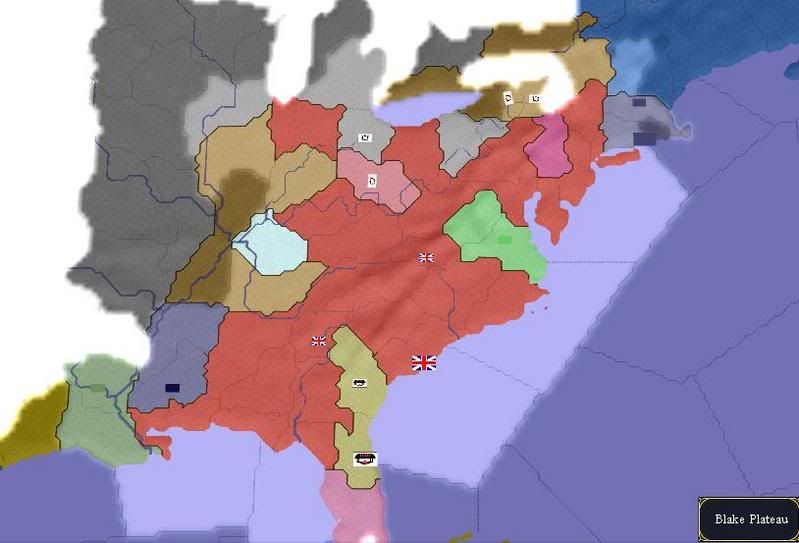
The British settlers burned for war in North America
By New Years Day the southern tribes had surrendered, leaving the Huron to fight the war alone. The British had the advantage, but the colonial army was small in number and had to cover broad territories. More than they ever had before, the colonies played a significant role in the war: colonial recruits now outnumbered British regulars, and in April 1587 the colonies donated 300 million ducats towards the prosecution of the war. Although this helped the crown recoup the costs of the campaign, it also awakened London to the growing wealth and population of the colonies - and led to later conflicts between crown and colonies over the next century.

The wealth of the colonies was growing, although it did not yet approach that of the home isles
The Succession
That fall, just after All Hallow's Eve 1587, Frederick finally passed away to the great grief of his subjects. He had lived just a few short months after his daughter reached her majority. He had not led Britain to greatness nor ruled many years, but he was a beloved king nevertheless. Perhaps it was his simple refusal of the crown earlier that had won him his subjects' respect, or perhaps the love and respect he and his wife had for each other; regardless, that great love of the monarch was passed on to his daughter, the young Anne I, and she returned that love as a patriot who wanted the best for her kingdoms.
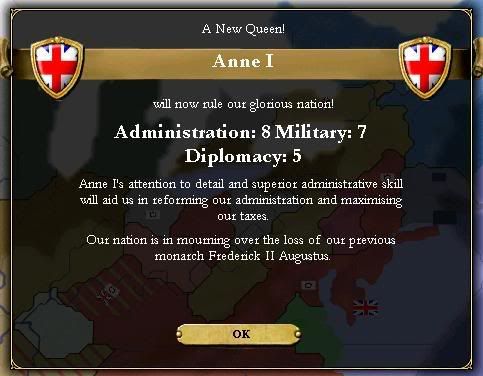
Anne I was a strong ruler at a time when queens were rare
Thanks to her father's great efforts on her behalf there was little real opposition to her rule, and with public support strongly behind her, the young queen ascended the throne on Christmas Day, 1587 as High Queen of Great Britain, Queen of England, Wales, Scotland, Ireland, Brittany and France. Her parents had raised her at court with the sad knowledge that she might be queen one day, and she lived and breathed life at court. She was said to be intelligent and quick-witted, able to turn aside an insult and captivate the men at court. She was not, however, a great beauty. Paintings from her reign show a plain, large woman - but one would never know it from the descriptions of her. Any man that could secure her hand won a kingdom for herself, and Anne was confronted with suitors of all ages and all nationalities throughout her reign. Her doting father had refused to affiance her as a child, and now she had the power to refuse offers herself; for over a decade the so-called Virgin Queen refused all offers, and gradually they dried up. She was extraordinarily strong-willed and did not trust her husband to allow her to reign; she had also been taught by her father to despise courtiers. Although the nobility grumbled at the idea of a Queen Regnant, Anne proved to be an effective monarch. She had a talent of motivating men, many of whom took her single status as encouragement, and she was also immune to flattery. All in all, she was perhaps the most effective monarch of her century.
Under her rule the Huron were humbled, losing all the lands they had taken in the previous war and cut off from French aid. Anne called upon the bankers of London and raised the funds to pacify the new lands, which were the source of the valuable fur trade that was so lucrative for the British during Anne's reign. She used these funds and more to continue colonizing even as she prepared for war on a new front. Ten thousand new troops were called to fight in Normandy, made up of French subjects loyal to the queen. This was deeply unpopular in Britain, where the French were seen as the enemy, but Anne's steadfast trust in the Normans helped win the loyalty of her French subjects for the crown.

Under Anne, French rights were promoted throughout the Kingdoms
New generals were promoted, not on the basis of her favorites but on merit; in this, Anne had the support of her ministers, who proved to have a sharp eye for quality in the army. Recognizing that the Royal Navy was still weak, Anne ordered a new class of ship to be built, and the HMS Minotaur became the first Galleon to come out of the Cinque Ports in 1594. And, in the hopes of forming a matrimonial bond with Anne, the Duke of Savoy proposed an alliance with Britain in August 1493. Anne accepted the alliance, spurned his advances, and ordered war with France the same month.
"A Leaden Crown"
Although she, like her ancestors, had claimed the crown of France as her own, the Issue of France was still a weighty one. Europe was still deeply suspicious of the United Kingdoms, and although humbled, France was still a powerful nation with many allies. Anne had no wish to see her empire ruined by war, whether with France or with Spain and Germany - yet at the same time, she could not trust France to remain quiescent while she concentrated on expanding her empire in the Americas. War with France was a necessity, one that promised to keep Britain trapped in a series of wars for generations. On the eve of war, Anne brought the bill to Parliament with these words:
No Dowry have I, but a Curse that Carrys Men to Hell; for the Weighte of the Empyre sits as a Leadenne Crown upon the Brow of Her Servants, and No Man More Her Servante Than I. To Free Britain of This French Gyfte One of us Must Kneele t'Other.
Anne had but one goal for the war: to end the threat of France for good. For several weeks the high command worked feverishly on a series of plans to carry out these wishes, and in the end three plans were suggested. The Buckingham Plan looked back to Henry VI and called for an arrangement with the King of France where he would acknowledge Anne's son as the heir to the throne of France. This had some support since the king of France and his wife were as yet not blessed with child, but it was never taken seriously by general staff or by Anne, who was still unmarried, and it was quickly discarded. The Rooke Plan proposed isolating Paris to weaken the French monarchy, while the Gloucester Plan went even further by demanding or even fomenting the release of Gascony and other French vassals. Either could leave the field free for Britain to be the uncontested ruler of France without angering Spain. The Gloucester Plan was given precedence and the order for war given.
The situation in was very different from the earlier war. In 1579 the two nations were roughly equal, with both having clear advantages and the outcome being in doubt. In 1593 Britain held all the cards. It had grown stronger while France had grown weaker; Paris lay but a few short miles from British armies, British troops were veterans and their officers well-trained, a rebuilt navy was on a par with the French, and New France had been revealed to be a paper tiger. The only advantage France had was a new sense of nationalism that unified the country against the British Invasion. This war would not see the popular rebellions Frederick's armies had enjoyed. Instead, France would hold on with sheer determination and the hope that Castille, the great Catholic power, would come to her aid if the war went against her. The British armies in the north were able to push forward against inferior French defenders, using her vassals in the east against France's forces there, and with Savoyard troops marching through Provence. Paris soon fell in January 1594 and save for fighting in Picardy, all of the north was in British hands by the end of the year.
In the New World New France put up little resistance to the British invasion. This time the British concentrated their forces, allowing them to take control of the south while they seized the colony of Acadia outright. However, the British preoccupation once more caused foment among the natives and that spring fighting broke out again in the Americas. As they had before, the Huron travelled down the Suquehanna while the British troops travelled up the St. Lawrence towards Quebed. This time, however, Sir Hugh Burgoyne had been placed in charge of 8,000 colonials and the defense of the Colonies. What could have been an impossible task for another man was impeccably carried out by the general; he fought each tribe one at a time and won peace with all three by early 1596.
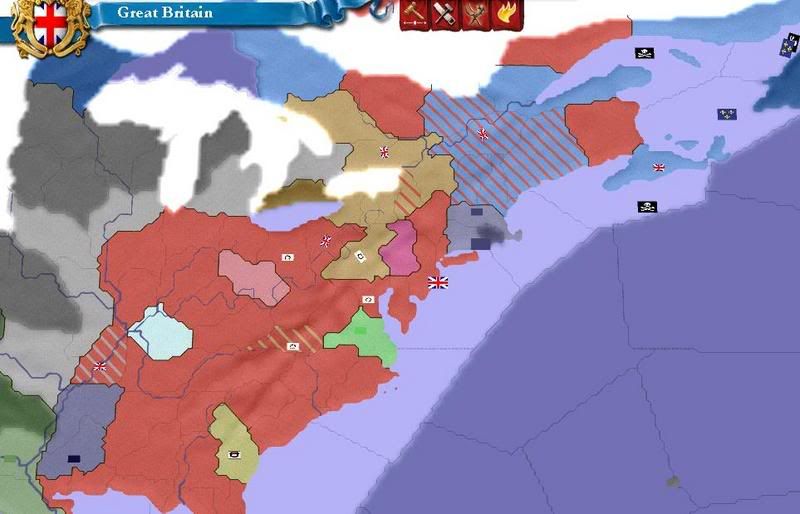
The war in New France was decidedly one-sided
In France, both sides were nearing exhaustion as the British forces continued to push south, but the British were clearly in control of the war; save for Picardy, the French had been unable to launch any serious counteroffensives and unable to recover from battles. At sea the two forces had clashed repeatedly without any clear victor - but that in itself was a victory for the Kingdoms of the Isles, which allowed it to ferry over reserves and fresh troops at will. The fighting at sea also inspired the Early Frigates that first appeared in 1598, after the war. In a clear sign of weakness, France began offering concessions shortly after the war began. Had Anne accepted, Normandy would have left the French crown entirely and become part of the British patrimony. Instead, the British counteroffers were repeatedly rejected. Francois realized that by giving more freedom to his vassals, he would be spelling his certain doom and resisted every offer made.
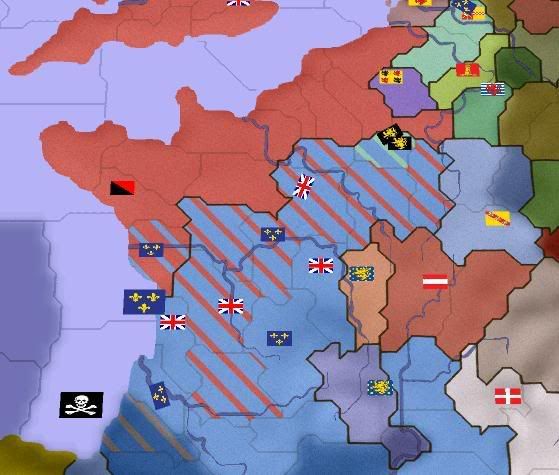
The war progress shortly before the French surrender
As the fighting continued, British reserves fell even as the war reached a successful conclusion. With half the country in British hands and France continued stubbornly refusing their demands, British negotiators finally switched to the Rooke Plan. In May 1597, France conceded central France to Anne - and in so doing left Francois a captive king surrounded by the British on all sides.
End of a Dynasty
The new lands were insignificant to the crown but vital to France, and made the difference between the two nations even greater, even insurmountable. It was clear from the war that France was incapable of regaining its lost land without help - and that Castille was unwilling to fight a war over a few hundred miles of territory. As long as Britain continued this conservative strategy of seizing land gradually, it could do so uncontested. Yet this was far from the victory Anne had envisioned, and the treaty put the queen into a depression for some weeks. The victory did have a great impact on Britain, however: by redistributing church property in France, Anne was able to win the loyalty of many nobles and win support for future wars - but Anne was displeased.
The victory was a hollow one if it left Great Britain absorbed by war for the next fifty years, and worse, it was by no means certain. Then an event happened which was to change everything. In the early months of 1599, Katerina of Koln died of pneumonia along with her unborn babe. Better known as Queen Catherine of France, Katerina's death left Francois without heir or wife, and this unhappy event which was to lead to one of the most fateful events in the history of Europe: in secret, Anne sent the grieving, defeated Francois an offer he found hard to resist, and by June of 1599 the Virgin Queen travelled to Paris where she knelt in front of Francois and gave her his hand in marriage. In one bold stroke the two crowns were united in marriage, with both crowns to pass to their mutual heir - who could truly claim the crowns of both. The future of the two kingdoms would now be intertwined, for better or for worse. This act would spark the War of French Succession and pit the forces of both against the unchallenged might of Spain and its allies; it would create tensions between British and French, Catholic and Protestant that would ultimately lead to understanding - at the expense of some of the less prevalent minorities of the empire. And it would lead to a powerful, united North America that would have no enemies - but because of that would wonder why it needed the protection of the empire. Anne had been accepted by the French, but the British were less accepting of Francois, and he rarely ventured outside of his kingdom. Nevertheless, their children began a new dynasty that would rule Great Britain for the next two centuries. Eventually, Britain and Spain would have to turn from their rivalry in the Americas towards the east to face the triple threat of the Ottomans, Russians and Germans, but through all its ups and downs, through the discovery of Alaska, the East India Company, the American Revolution and the Spanish Revolution that followed it, even through the Great War, all through the ages Great Britain and France would be ruled by the House of Valois. Never again would the House of Lancaster reign in Britain...but the legacy of the House of Lancaster would reverbate until the present day.
The United Kingdoms in 1599
Treasury: 307 million ducats
Estimated GDP: 2522.4 million ducats
Standing Army: 59,000 Maurician infantry and 18,000 Caracolle cavalry
Reserves: 40,000
Royal Navy: 10 galleons, 6 caravels, 4 carracks, 9 early frigates and 5 flytes
Prestige: 1st highest (89.8)
Reputation: Extremely Bad (18.47/20.5)
Europe in 1599
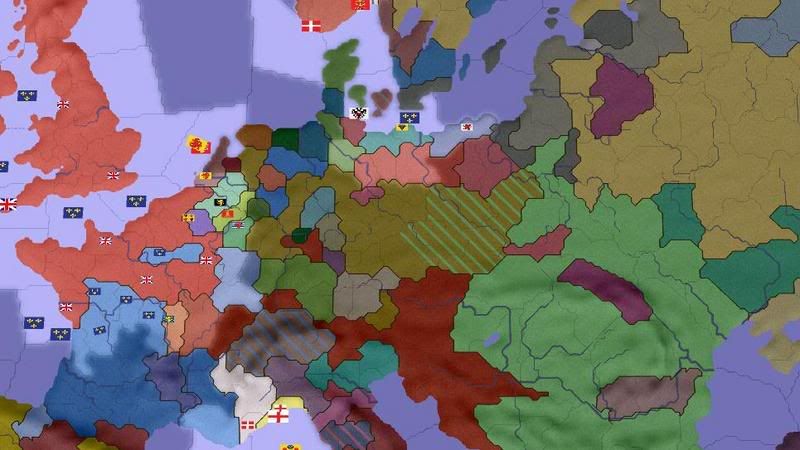
FIN
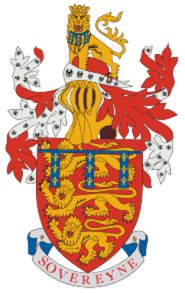
Magnificient! This is one of the best AAR:s ever. To bad it had to end now  But im looking forward for your next one
But im looking forward for your next one 
Victory in terms of land owned yet defeat in the blood. And how sad we did not get to read the tale of the united crowns of England and France - in an AAR of such high quality as this one, it would have been worth the read 
Congratulations on such an excellent chronicle of the House of Lancaster. I'll be keeping an eye out for further work of yours
Congratulations on such an excellent chronicle of the House of Lancaster. I'll be keeping an eye out for further work of yours
David, that was great. Everyone has said it: sad to see it ending. I can completely understand why, but you've really created a vivid world, and those of us who have followed it will miss it.
Thank you to everyone! You're too kind. 
After a reception like that, how could I refuse to write another? ...Unfortunately, it won't be any time soon. If all goes well, I will be thrust into a new job next week and my life will be insane for at least a month to come - I can't imagine finding the time to play EU3, let alone write an AAR.
But eventually things will settle down - and then I'll write again.
After a reception like that, how could I refuse to write another? ...Unfortunately, it won't be any time soon. If all goes well, I will be thrust into a new job next week and my life will be insane for at least a month to come - I can't imagine finding the time to play EU3, let alone write an AAR.
But eventually things will settle down - and then I'll write again.
An excellently worked conclusion. Congratulations on a successful AAR. Perhaps we can hope for another?
A truly masterly AAR!
What an irony that after all of these wars over the French crown it is the house of Valois that in the end comes to rule the United Mega Kingdom of Britain and France.
Anyway I can't wait for your next adventure!
~Lord Valentine~
What an irony that after all of these wars over the French crown it is the house of Valois that in the end comes to rule the United Mega Kingdom of Britain and France.
Anyway I can't wait for your next adventure!
~Lord Valentine~
Well done and though I don't care for a Valois on the English throne, it makes perfect sense to include that.
An excellent AAR, sir! Congrats on finishing.
An excellent AAR, sir! Congrats on finishing.

